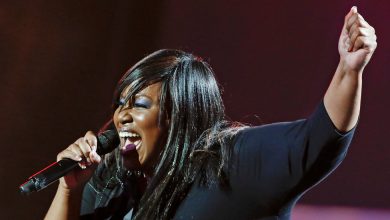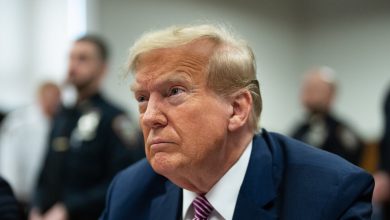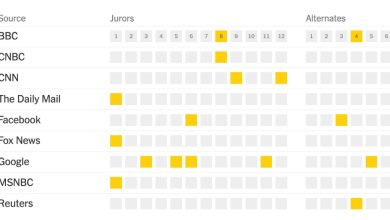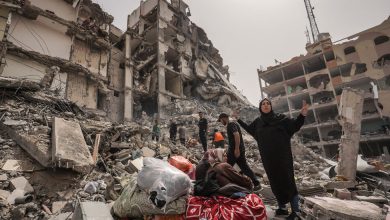Belief or Betrayal? Ukraine’s Conscientious Objectors Face Hostility
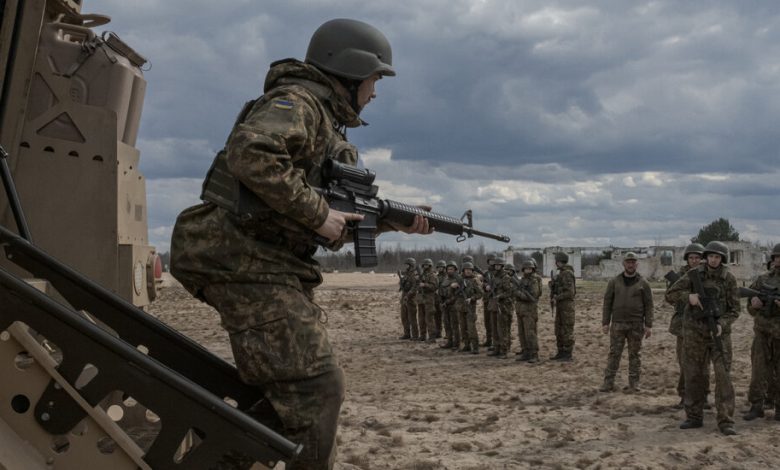
On just the fifth day of the war, Mykhailo Yavorsky decided to pay a visit to a local military enlistment office, not to enlist in the battle against the invading Russian forces but to explain why he could not.
“Please excuse me, I cannot fight, I will not shoot,” Mr. Yavorsky, 40, said he told the officers last year. “I can help you with something else.”
Mr. Yavorsky said he wanted to support Ukraine but only in accordance with “biblical principles.” His pleas fell on deaf ears, however, and he was later sentenced to a year in prison, one of about a dozen Ukrainians seeking an alternative to military service as conscientious objectors who have been prosecuted for refusing to fight in the war.
While these cases are few — and frequently dismissed by Ukrainians as a cloak for pro-Russian sympathies or just fear — they raise questions about respect for human rights in a country that up until the full-scale invasion allowed for “alternative service” on religious grounds. They also shed light on the delicate line between duty and principles 18 months into a bloody war.
Mr. Yavorsky is appealing his sentence, and to date only one conscientious objector has served jail time. Some objectors have received suspended sentences, and some cases have not yet been resolved. The Ministry of Defense did not respond to questions about specific cases.
Thousands of Ukrainian men of military age have fled the country to avoid participating in the war, some wading across a river or paying smugglers to get them across the border. (In June, the State Border Guard said that up to 20 men are arrested every day for trying to leave the country illegally.) Others have worked connections or paid thousands of dollars to bribe recruitment officers to forge documents declaring them unfit for service.
The objectors insist that their public positions are not betrayals of their homeland but stem from deeply held principles and religious beliefs.
Conscientious objection to military service is an internationally recognized right, one enshrined in Ukraine’s Constitution. But when Russia invaded Ukraine, President Volodymyr Zelensky instituted martial law. With that, the right to alternative service related to conscientious objection effectively evaporated.
Not only is objection a “human right,” said Eli S. McCarthy, a professor of justice and peace studies at Georgetown University, it is “critical to commitments that Ukraine has made” to international bodies and aspirations to join the European Union.
Mr. Yavorsky, who works in real estate, acknowledges that his family is worried, but called his legal struggles “trivial” in light of the suffering in Ukraine.
“I’m not saying that I have a very strong tragedy and I am the most unhappy person in Ukraine,” he said. “But there are a lot of people who do not want to serve. It is necessary to give them another opportunity to help the state.”
The sacrifices of soldiers are visible everywhere in Mr. Yavorsky’s hometown, Ivano-Frankivsk. Billboards bearing their photos dot the highway into the city. The cemetery has a whole section for them — seven rows, each with 15 graves. One recent afternoon, a new row had been started, with a freshly-dug grave awaiting its occupant.
Mr. Yavorsky’s office, with a bookshelf full of bibles, is a short walk from the “Alley of Heroes”— 272 posters of fallen soldiers stretching a few blocks on a pedestrian street. He said he understands why so many of his countrymen are fighting — but that they should also understand his position.
“I am not ready to kill another person for a piece of Ukraine or a piece of New Zealand or a piece of the United States,” Mr. Yavorsky said. “I have other values, and I want my values to be at least listened to.”
And if his choice might be viewed as betrayal? “I don’t care what anyone thinks about me,” he said. “What matters to me is what God thinks.”
Ukraine has remained remarkably united throughout the grinding fight for its very existence, leaving little room to express doubts, or reluctance to join the battle. Men who dodge mobilization are called cowards or traitors.
The conscientious objectors represent a tiny segment of a broader phenomenon creeping beneath the surface in Ukraine. Though rarely talked about, there is fatigue and wariness about the draft.
When Russia invaded, Mr. Zelensky’s declaration of martial law barred men aged 18 to 60 from leaving the country and Ukrainians poured into military recruitment centers. Eighteen months later, the pool for eager recruits has thinned, while mobilization has enlisted thousands.
While countless Ukrainian men have taken drastic measures to dodge the draft, a subtler trend is also at play: In conversation, Ukrainians describe friends adjusting routines to avoid document checks or running into recruiters.
Despite his objection to fighting, running away was never an option for Vitaly Alekseenko, the first known objector jailed after the full-scale invasion. “I love Ukraine, I love people,” he said. “I am a believer. Why should I hide?”
Mr. Alekseenko, 46, said his case is about fundamental rights — not a measure of his patriotism. “If it’s glory to Ukraine, then glory to free Ukraine,” he said, his voice rising, “so that my rights are respected, as it is written in the Constitution.”
He’d come to Ivano-Frankivsk as a displaced person and was instructed to report to the military recruitment center. That’s where he said he requested alternative service, telling them “that I was a believer, that I was not going to fight.”
He expected the request would be granted — he’d performed alternative service in Uzbekistan in the 1990s. Instead, he was ultimately convicted of avoiding the call-up and sent to jail.
“The first week was hard, then it went by quickly,” he said, describing anger at being “locked in a room against your will.”
Released after three months for a retrial, he now lives in a tiny, shared room off a communal kitchen on the seventh floor of an old building with no elevator. Wearing oversized flip-flops and a checkered shirt, he stopped in the stairwell to greet a neighbor one afternoon.
Not everyone has been so friendly after learning his position on the war. He described another neighbor emotionally confronting him, saying “guys are fighting, they’re protecting you.”
“I told her I don’t need to be protected,” he said, sitting cross-legged outside his building as the sounds of a nearby church’s Sunday service echoed. “Killing someone else is not defense,” he added. “You kill somebody and it’s somebody else’s child.”
He expressed some dissatisfaction with the Ukrainian government, but denied that political considerations played a role in his decision, saying it was “100 percent” about religion.
Yet, Mr. Alekseenko does not attend church. “I can pray in my mind,” he explained. That has led to questions about his sincerity; paperwork rejecting his alternative service request cited insufficient proof of his faith.
He animatedly cites scripture, his finger jabbing each word into the air. Instead of answering “evil with evil” when it comes to Russia’s invasion, he said, “better to sacrifice ourselves.”
That, he says, is why he was willing to go to prison for his beliefs. “I don’t want to kill anybody, that’s for sure,” he explained. “I already know that I’d rather die myself. That’s all. I’m not even afraid of prison.”
A serving soldier, Andrii Vyshnevetsky, cited the same biblical passages to explain his requests for military discharge to alternative service.
Unlike others interviewed for this article, Mr. Vyshnevetsky said he supports “neither Russia nor Ukraine” in the war — only peace. While Russian missiles killing civilians causes “pain in my soul,” he said, “people are dying on both sides, not only Ukrainians, but also Russians.”
Mr. Vyshnevetsky wears a photo of his wife and daughter around his neck, saying he prays “every day” to be home with them.
“Those who refuse to take weapons and do not want to fight should be exempted from military service,” he said. “A person who believes in God and who is against the war will not go to kill, but will be just cannon fodder.”

